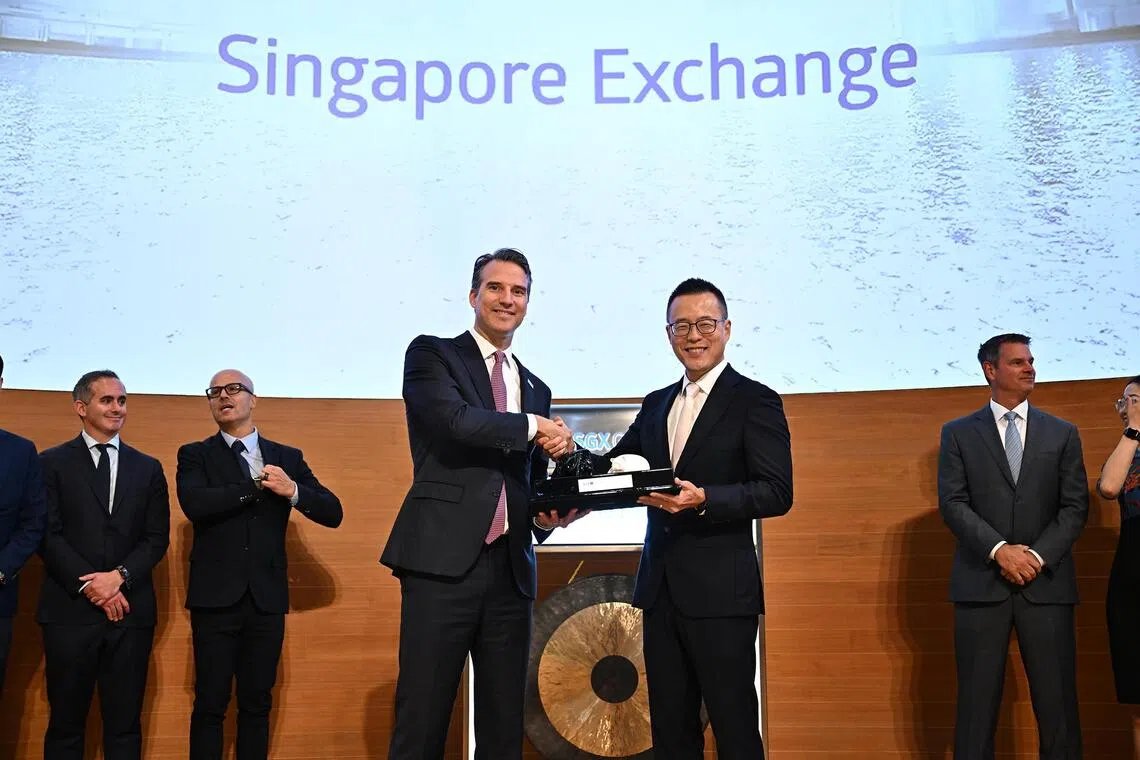Market Insights
Four new companies list on SGX; Centurion Reit second-largest listing for 2025 to date
Sign up now: Get ST's newsletters delivered to your inbox

SGX Group senior managing director and head of global sales and origination Pol de Win (left) presenting a token of appreciation to AvePoint chief executive Tianyi Jiang at the company’s secondary listing ceremony on Sept 19.
PHOTO: SGX
Follow topic:
SINGAPORE – It was a rather muted week on the Straits Times Index (STI), which closed at 4,302.71 points on Sept 19.
The index edged down steadily through the week by almost 1 per cent cumulatively, with DBS Bank shares pulling back from the previous week’s high.
But the Singapore Exchange (SGX) mainboard was a slightly different story. AEM saw its shares jump almost 18 per cent on the back of news that Nvidia would invest US$5 billion (S$6.4 billion) in Intel, which AEM counts as a key customer.
The Sept 18 announcement by Nvidia will make the company one of Intel’s largest shareholders.
AEM closed at a high of $1.85 for the week.
Four new companies on SGX
Skylink, the third-largest motor vehicle leasing company in Singapore, made headlines when it debuted on the SGX last week.
The Catalist-listed shares started trading on Sept 17 at 24.5 cents and ended its first day at 25 cents, with 10.8 million shares exchanged. It ended the week at 41 cents.
Skylink chief executive officer Wesley Shen said in a statement that listing on Catalist provides the company with “greater visibility and access to the capital markets to fund our growth strategies” to eventually “deliver long-term, sustainable value to shareholders”.
The company made a U-turn following the takeover of home-grown commercial vehicle specialist Skylink Apac by the Sincap Group, with Sincap shareholders approving the deal on Sept 11 and with Sincap renamed as Skylink Holdings.

Skylink chief executive officer Wesley Shen said that listing on Catalist provides the company with “greater visibility and access to the capital markets to fund our growth strategies”.
ST PHOTO: BRIAN TEO
The Skylink Apac acquisition was completed on Sept 15 for $42.3 million.
This is the second car company to list on the SGX in 2025.
The first was car dealer Vin’s Holdings, which raised $6 million from its initial public offering (IPO) on Catalist in April.
Centurion Accommodation Reit’s IPO launch on the night of Sept 18 was a blockbuster.
The real estate investment trust (Reit) aims to raise around $771 million from the IPO, and is expected to have a market capitalisation of more than $1.5 billion upon listing on the SGX mainboard from 2pm on Sept 25.
This makes it the second-largest listing on the SGX for the year to date, after NTT DC Reit went public in July.
Centurion’s Reit launched 262.2 million units priced at 88 cents each, of which 13.2 million units are available to the public.
There will also be an international placement of about 249 million units, and more than 614 million additional units will be taken up by 16 cornerstone investors, which include DBS, Amova Asset Management and abrdn Asia.
The Reit will hold an initial portfolio of 14 properties valued at $1.8 billion, comprising five purpose-built worker accommodation assets in Singapore, as well as eight purpose-built student accommodation assets in Britain and one in Australia. Distribution yield is projected at 7.47 per cent for 2026 and 8.11 per cent for 2027, based on the expanded portfolio and offer price.
On Sept 18, Centurion Asset Management chief executive Tony Bin said demand for beds at its student and worker accommodation assets is underpinned by strong market tailwinds.
The same day, Boustead Singapore announced the name of its proposed Reit listing, the UI Boustead Reit, which is estimated to have a portfolio value of around $1.9 billion.
In a bourse filing, the engineering and technology company said the portfolio will comprise 23 logistics and industrial properties, with 21 leasehold properties in Singapore and two freehold properties in Japan.
The valuation will be used to decide how much will be paid to acquire the assets – some of the properties will be bought directly, while others will be bought through the acquisition of other Reits that hold these properties.
Details of its proposed Reit listing come about two weeks after the company said that it applied for the listing on behalf of UIB Holdings, the proposed sponsor of the Reit. Boustead Singapore holds a 20 per cent interest in UIB through Boustead Projects.
Shares of Boustead Singapore closed flat at $1.76 after the Sept 18 announcement, and ended the week slightly lower at $1.74.
The final addition to the excitement last week was US-based software company AvePoint, which proposed a secondary SGX listing after filing its prospectus on Sept 16.
It sold 13.29 million vendor shares worth $259 million upon its SGX debut on Sept 19. Shares opened at $20.20, though the counter later closed at $19.70, which was 20 cents above its offer price. More than 760,000 shares changed hands.
The offer for underwriters to buy another 1.99 million shares was also oversubscribed by more than three times. Forty institutional investors were allocated shares.
AvePoint’s listing on the SGX marks the first Nasdaq-SGX dual listing. The company, which has been listed on Nasdaq since 2021 and is based in New Jersey, has its Asia headquarters in Singapore.
AvePoint chief executive officer and co-founder Jiang Tianyi said the SGX listing is an “exciting step in AvePoint’s ongoing global expansion” as demand for its data protection technology increases.
Long-term hotel operator bids adieu to S’pore icon
On Sept 15, the InterContinental Hotels Group (IHG) said it will exit the InterContinental Singapore in Bugis by end-2025, when its hotel management agreement comes to an end.
The property is owned by Frasers Hospitality Trust (FHT).
Mr Eric Gan, chief executive of FHT’s manager, said during an investors’ meeting on Aug 15: “There may be a mismatch in the profile of inbound travellers and (the) profile of a property’s targeted guests segment due to price sensitivity and elasticity of demand.”
In a joint media statement on Sept 16, FHT and Frasers Hospitality said the hotel “will continue operations and remain a key asset of Frasers Hospitality” even as it exits the IHG system with effect from Jan 1, 2026.
Frasers Hospitality is the hospitality arm of Singapore-listed Frasers Property, controlled by one of Thailand’s richest men, Mr Charoen Sirivadhanabhakdi.
The statement added that any change in hotel operator is “consistent with Frasers Hospitality’s active asset management strategy”, and that further updates will be shared in due course. Marriott International is understood to be on the shortlist to operate the rebranded property, according to The Business Times, which broke the news on Sept 15.
FHT’s Singapore-listed units are suspended ahead of its delisting on Oct 6.
Others
Department store operator Metro saw its shares advance last week, hitting a two-year high at 55 cents in intra-day trade on Sept 16. It dropped a little to 53 cents by market close.
The rise followed news of its retail strategy revamp, which includes a partnership with South Korean retail group Shinsegae to be the exclusive distributor of certain brands in Singapore, and also for the group to carry Metro brands.
Metro Holdings’ retail division posted a loss after tax of $6.9 million for its financial year 2025, compared with a $1.8 million profit the year before. On a group level, it recorded a $224.8 million net loss for the financial year 2025, a big drop from a $14.6 million net profit the year before.
Metro Holdings’ other business is property investment and development, and the group attributed the overall weaker bottom line to non-cash fair value and impairment losses from its China real estate exposure.
Shares of Marco Polo Marine were among the most traded for the week after it announced on Sept 17 it had won $100 million worth of orders at the end of its third quarter.
The shipyard, offshore energy and marine transportation services company also said it expects the completion of its fourth dry dock, the addition of new crew-transfer vessels, and the income from the commissioning of service operation vessel Wind Archer to contribute to its performance for the rest of its financial year 2025 and 2026.
Shares rose as much as 6.7 per cent on the morning of Sept 18, and ended the week higher at 7.6 cents.
What to look out for
Sept 22 marks the launch of the new iEdge Singapore Next 50 Indices by SGX Indices, two new benchmarks that will track the performance of the next tier of large and liquid mainboard companies, outside the flagship STI.
The indexes are available in two variants: one weighted by market capitalisation, and the other by liquidity.
Mr Ng Yao Loong, head of equities at SGX Group, said the initiative is part of the group’s efforts to “build a more vibrant and inclusive stock market ecosystem”.
He added: “By showcasing companies beyond the 30 largest, we are helping investors to better capitalise on the full spectrum of opportunities in Singapore’s stock market. It also serves as a starting point for market participants to explore innovative ways of tracking the performance of different segments of the Singapore market.”
Beyond this week, Lion Global Investors’ new exchange-traded fund (ETF) will list on SGX on Sept 29.
Called the LionGlobal Short Duration Bond Fund (Active ETF SGD Class), the initial offer period started on Sept 8 and will end on Sept 23.
The ETF’s distributions are intended to be released at the end of each quarter, with 0.25 per cent per annum management fee.


